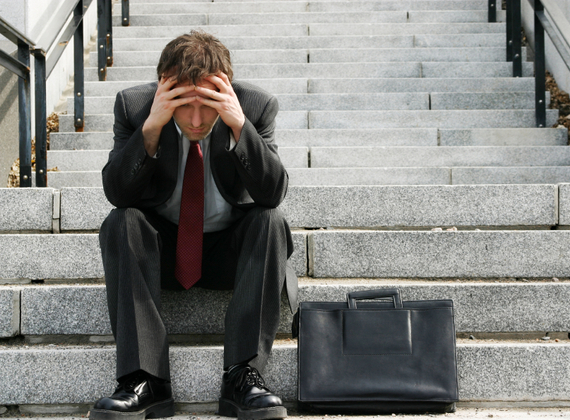If you're waiting for your next big vacation to truly de-stress, you may be putting yourself at risk for burnout. Here in the U.S., we don't even guarantee paid time off for all, making us the only advanced country leaving our workers with zero time to regroup.
A close friend of mine was recently getting ready to take a much-needed rest, when she and her colleagues were informed of massive lay-offs-plus all vacations being suspended indefinitely. It happens to be peak-summertime in New England, and our recent snowiest-winter-ever isn't quite a distant memory. This is our time to come out and play-and get a little vitamin D. As you might imagine, morale is at an all-time low, and she and her colleagues are getting sick from the stress they are under.
Even when allotted and allowed, we leave more unused vacation days on the table than any other country. A report from Oxford Economics points to a pervasive workaholic paradigm as problematic: "Our 24-7, always on, hard-charging culture has created a nation of work martyrs -- the type that take few vacation days, come into the office sick and pride themselves on being seen at a desk". A recent study demonstrates that Americans are not only too busy to take vacations, but we don't even take lunch break. No soup for us.
When we do take our vacations, they are relatively short-lived, compared with lengthier 'holidays' taken by many of our friends across the globe. On top of that, by the time we detox from our technology -- if we even have the luxury of truly unplugging, we're back in the mix again.
Add to this, there is no guarantee that our vacations will live up to the hype -- especially when intensive anxiety and exhaustion have already set in. Sometimes our brains are so full and our bodies are so tired that we can't fully absorb the needed respite. Plus, let's face it -- things can go wrong on vacations -- squabbles happen...bad news from home emerges...medical issues strike...cruise ships sink. We can't expect pure bliss as an absolute guarantee during a scripted time frame. It's hard to imagine that a few days a year could really be enough to recharge our batteries. This makes our day-to-day efforts to keep burnout at bay vital to our health and wellbeing.
The trouble is, the idea of taking even small, routine breaks can make us pretty anxious. When we're under the gun, we're apt to think that we have to stay in perpetual go mode. The fear of falling behind and the pressure to carry out Herculean-like feats just to keep our heads above water can create some pretty unhealthy consequences. We wake up startled. Our hearts pound. We crash and burn, and then go back for more. We do a number on our brains and bodies, because it seems like there is simply no choice but to constantly crank.
Our employers might not be adept at creating conditions that keep our wellbeing front and center. Despite overwhelming evidence that healthy employees are happier and more likely to perform better, organizations are still lagging in adopting health friendly programs and policies that help create conditions where we can thrive.
Our world of work can lead us to unhealthy beliefs and behaviors if we're not careful. Instead of the constant brow beating, what would happen if we started including simple break rituals into our daily routines? In his book, Happier, Dr. Ben-Shahar describes rituals as precise behaviors being performed at a specific time, as useful tools for our wellbeing. Break rituals are our chance to embed brief moments of solace in our daily lives to help us decompress and clear our heads. They provide a needed chance to come up for air and counteract all the intensity our non-stop environments can bring.
Break rituals give us the chance for daily time-outs that fuel our energy and bring impact to our stress bottom line. The key is making them simple and consistent. According to Harvard Health Medical School, "mini relaxations" can bring about relief. People who include break rituals in their routines know we are not machines -- and a little TLC can go a long way towards sustaining ourselves through long checklists and days.
So, where to begin? Break rituals should be simple, and something you know will ground you and reaffirm your sense of purpose. Here are some ways to swim upstream against the no-soup-for-you, work 'til you drop mindset:
1. Take a cue from Julie Andrews: Let's start at the very beginning to identify your go-to comforts. It may not be raindrops on roses or blue satin sashes, but chances are you have your own unique collection of favorite things that make you feel better. Break rituals should include things that refresh us, heighten our senses and bring about a strong measure of relief. Whether sipping a cup of tea, taking the scenic route to work, chatting it up with a fun co-worker or repeating helpful mantras, the key is to make them consistent and predictable aspects of your routine, ones you look forward to.
2. Rethink your lunch break: As many of our Grandmothers have said, "Eat!" When we leave our bodies depleted of nutrition, we aren't doing ourselves any favors. The trouble is, a 60- or even 30-minute chunk of time rarely magically presents itself. Think about your work variables and decide how many incremental breaks are possible, and how long you can swing for. If you can't avoid eating at your desk, take a few minutes to walk. Working through your breaks is detrimental. Being chained to our workspace limits our capacity to infuse needed retreat moments into our days. Fuel your body with nutrition and movement.
3. Set boundaries: It's incredibly difficult to be amongst the few who cry uncle and ask for more humane ways of working. In most settings, overwork is the norm and there's little room for budging. Give yourself permission to leave a little wiggle room in your schedule to engage in your break rituals. Consider your time as sacred and protect it. Quiet your guilty voice by reminding yourself that a recalibrated you will likely produce more. Affirm your reasonable voice that knows how important it is to prioritize your health and wellbeing. Work is important, but not worth getting sick over.
What are some of your favorite break rituals? If you're getting swept away from the demands before you, try and evaluate some simple ones to get started with. Ask your colleagues what they are doing. Spur each other on. Burnout is serious, and instead of waiting for a grand vacation to undo the damage of 24-7 work, embedding break rituals into our routines can help us avoid falling prey to it.


